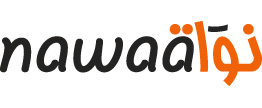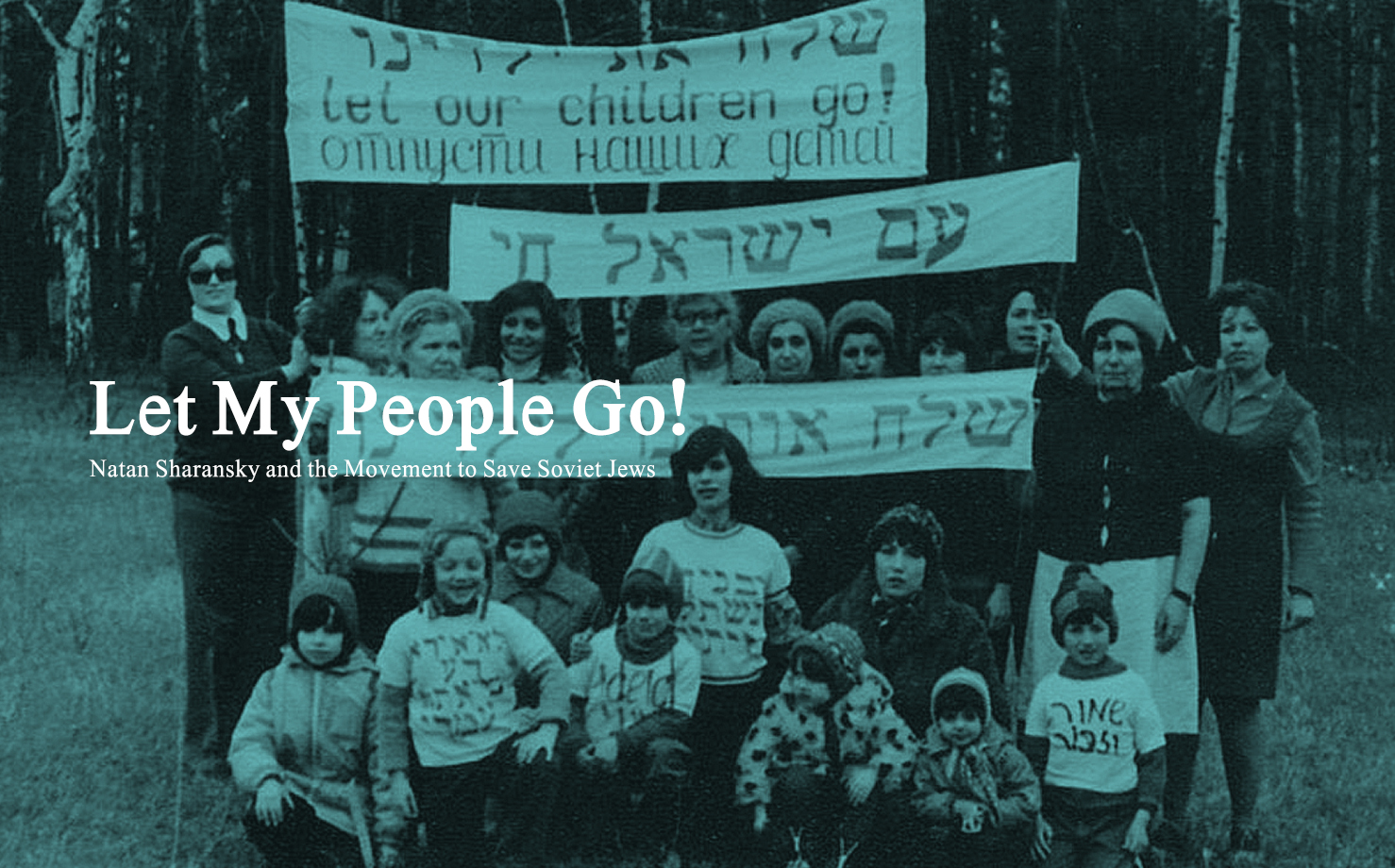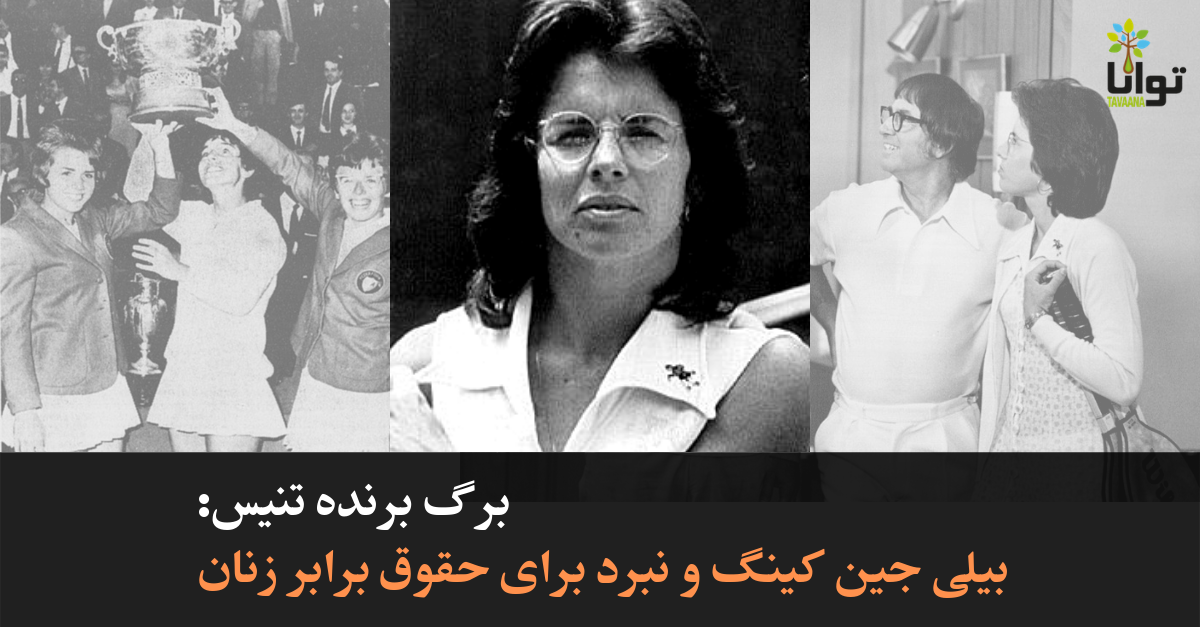Vision and Motivation
Over the course of two decades, former President Zine El-Abidine Ben Ali sold Tunisia as a “moderate” Arab state to Western powers, but Tunisian citizens knew the truth. Tunisia was anything but “moderate.” With its severe controls on freedom of expression, the government maintained a stranglehold on civil society and committed an array of human rights violations. A common joke among Tunisians was that President Ben Ali had three goals for his presidency: to stay in power, to stay in power, and to stay in power. [1]
Amidst mounting dissatisfaction over high unemployment, corruption, lack of civil liberties, electoral manipulation, and digital repression, Nawaat.org, an independent crowd-sourced blog, was launched on April 4, 2004. As one of its co-founders put it, Nawaat, meaning ‘core’ or ‘nucleus’ in Arabic, “was launched in order to provide a public platform for oppressed voices and debates.” [2] The website filled the void left by regime-controlled media and bridged the gap between international media and local activists. Nawaat battled with government censorship from its conception, constantly seeking new tools to outsmart sophisticated regime attacks. It was not until the day before Ben Ali fled the country in January 2011 that Nawaat was removed from the list of over 100 blocked websites and blogs in Tunisia.
Goals and Objectives
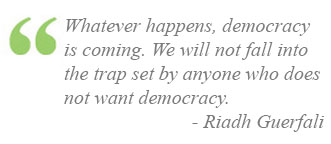 Nawaat was founded by two Tunisian free-speech activists who had fled the country in the 1990s: Riadh Guerfali and Sami Ben Gharbia. Because Nawaat reported on the Ben Ali regime’s human rights abuses, the site was promptly blocked in Tunisia. It then underwent relentless cyber-attacks, forcing the site to temporarily shut down and move to a different host seven months after its launch. The setback, however, did not deter Ben Gharbia and Guerfali. In response to the site’s temporary closure, the Nawaat editors wrote, “We will not yield to police blackmail. We will continue our fight against the Tunisian dictatorship, with the same perseverance and a spirit of renewal more creative than ever.” [3]
Nawaat was founded by two Tunisian free-speech activists who had fled the country in the 1990s: Riadh Guerfali and Sami Ben Gharbia. Because Nawaat reported on the Ben Ali regime’s human rights abuses, the site was promptly blocked in Tunisia. It then underwent relentless cyber-attacks, forcing the site to temporarily shut down and move to a different host seven months after its launch. The setback, however, did not deter Ben Gharbia and Guerfali. In response to the site’s temporary closure, the Nawaat editors wrote, “We will not yield to police blackmail. We will continue our fight against the Tunisian dictatorship, with the same perseverance and a spirit of renewal more creative than ever.” [3]
Nawaat’s goals have evolved along with Tunisia; during the Ben Ali era, Nawaat served as an independent media outlet for Tunisians, while during the revolution, Nawaat served as a bridge between local events and the Arab and international media, as it curated, translated, and archived news and videos in order to reach the international community. Today it continues to provide independent coverage of Tunisian events, including human rights issues, while it publicizes these issues internationally via blog posts, articles, and social networking in multiple languages, and also strives to strengthen the Tunisian media landscape.
From the beginning, Nawaat has aggregated articles written by journalists, academics, philosophers, artists, lawyers and digitally active Tunisians, providing them with an international platform to expose and discuss critical issues. Articles chronicling the regime’s corruption, the detention of activists and the repression of free speech have been posted on the site, seeking to bring international attention to the regime’s abuses of power. Posts covered Tunisian elections as well, debating the merits of boycotts and critiquing a flawed electoral system.
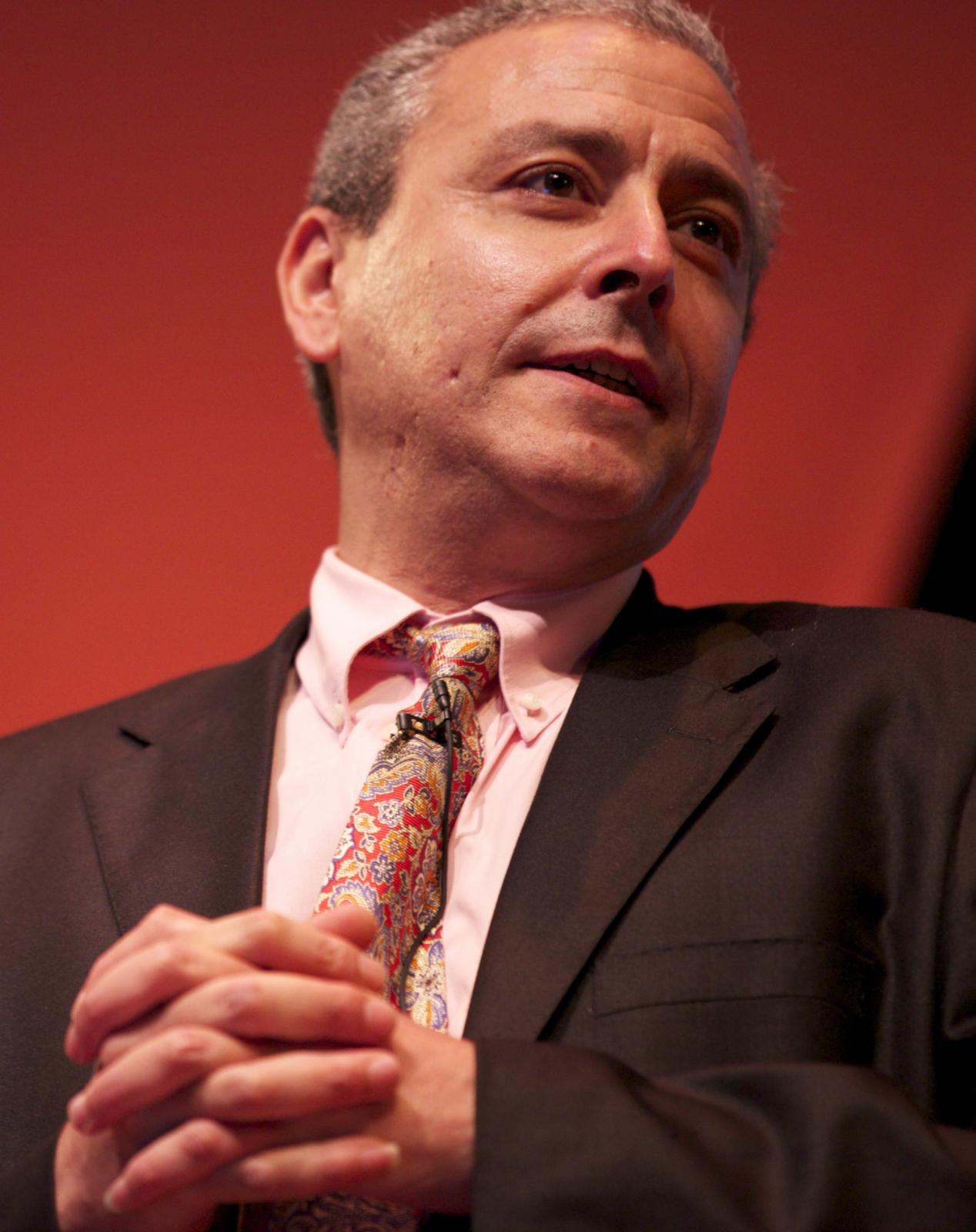 In 2006, Nawaat started documenting the location and status of Tunisia’s political prisoners on its Tunisian Prison Map, which plotted the locations of Tunisian prisons and detained activists on Google Maps. This publically available digital record illustrated the Ben Ali regime’s zero-tolerance policy towards opposition. However, Nawaat is not merely a space to digest information; it encourages user engagement through comments, posts and user polls. One example of Nawaat’s user-generated content is a 2007 video-post tracking Ben Ali’s travels aboard his presidential plane. Nawaat users contributed their photos taken around the world of the presidential plane. Nawaat criticized the inappropriate use of taxpayer money for unofficial trips and the failure of local media to cover the issue. The video tracking Ben Ali’s trips from 2001 to 2007 received nearly 400,000 views on YouTube, making it one of Nawaat’s most popular posts. [4]
In 2006, Nawaat started documenting the location and status of Tunisia’s political prisoners on its Tunisian Prison Map, which plotted the locations of Tunisian prisons and detained activists on Google Maps. This publically available digital record illustrated the Ben Ali regime’s zero-tolerance policy towards opposition. However, Nawaat is not merely a space to digest information; it encourages user engagement through comments, posts and user polls. One example of Nawaat’s user-generated content is a 2007 video-post tracking Ben Ali’s travels aboard his presidential plane. Nawaat users contributed their photos taken around the world of the presidential plane. Nawaat criticized the inappropriate use of taxpayer money for unofficial trips and the failure of local media to cover the issue. The video tracking Ben Ali’s trips from 2001 to 2007 received nearly 400,000 views on YouTube, making it one of Nawaat’s most popular posts. [4]
On August 16, 2010, when a technical hiccup partially lifted online content filters in Tunisia, Nawaat’s co-founders took advantage of this rare glimpse into the state’s censorship tactics. Ben Gharbia and Guerfali quickly produced an exposé detailing the regime’s tactics of URL blocking, DNS filtering, IP filtering and keyword filtering, using data uncovered during the technical malfunction. [5]
Just a few months later, Nawaat took its government watchdogging to new heights. On November 27, 2010, Nawaat launched TuniLeaks, a collection of State Department cables that documented regime corruption, affirming Tunisians’ suspicions of their government. The regime was quick to block access to the TuniLeaks site, but it could not repress Tunisians’ growing frustration over their government’s corruption. [6]
Leadership
Nawaat’s co-founders were able to use their technology skills and their connections inside Tunisia to build Nawaat from the outside. Ben Gharbia left Tunisia in 1998 after he was arrested and interrogated by the Tunisian regime. While applying for asylum in the Netherlands, he began researching human rights violations in Tunisia, thus establishing contacts with Tunisian organizations and activists and beginning his online activism. [7] He went on to become the Advocacy Director at Global Voices, an international online community of bloggers. Guerfali, a lawyer and academic, also left Tunisia in the 1990s to teach law at the University of Perpingnan in France. He adopted his online pseudonym, Astrubal, to keep his activist and professional lives compartmentalized. [8] The two co-founders contribute a minimal amount of Nawaat’s content, but they are experts at providing a platform for articles written by journalists and digitally active Tunisians. Speaking about their goal in creating Nawaat, Guerfali said, “We wanted to create a blog that is 100% Tunisian, able to relay a message in a context where free expression was blocked by Ben Ali, including on the Internet.” [9]
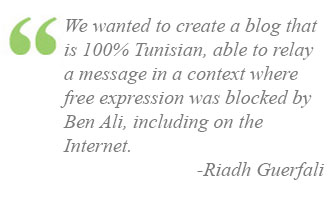 Ben Gharbia and Guerfali believe that citizens, rather than political parties, should directly drive social and political change. According to Ben Gharbia, “For digital activism in the Arab world to achieve its noble aspirations, it must remain independent and homegrown, tapping its financial, logistic and moral support [from] the grassroots level.” [10] This philosophy underlies Nawaat’s mission, which emphasizes total independence from political parties and partisanship.
Ben Gharbia and Guerfali believe that citizens, rather than political parties, should directly drive social and political change. According to Ben Gharbia, “For digital activism in the Arab world to achieve its noble aspirations, it must remain independent and homegrown, tapping its financial, logistic and moral support [from] the grassroots level.” [10] This philosophy underlies Nawaat’s mission, which emphasizes total independence from political parties and partisanship.
In 2011, Ben Gharbia and Guerfali demonstrated their commitment to free speech and Internet freedom when they declined the Arab eContent Award sponsored by the government of Bahrain. The co-founders announced, “We reject this award in protest against Bahrain’s Internet filtering practices, the arrest of scores of bloggers and human rights activists and the arbitrary blocking of hundreds of websites and blogs that are critical of the Bahraini government.” [11]
Civic Environment
Tensions and frustrations in Tunisia had been simmering for two decades under Ben Ali’s rule. After becoming president in 1987, Ben Ali clung to power through five sham elections, created private monopolies for his relatives, kept a tight grip on all government institutions and censored the press. In the run-up to his October 2009 re-election, Ben Ali’s ruling party dominated advertising and campaigning, leaving little to no room for opposition candidates. In efforts to further restrict the scope of public dialogue, independent journalists and commentators were harassed and arrested, and their articles were blocked. [12] Meanwhile, the regime launched a campaign of digital repression. Regime censors hacked personal emails and replaced dissenting content with spam. [13] Nonetheless, Nawaat remained a space for Tunisians to check the regime’s actions and build an online civil society.
On December 17, 2010, tensions and frustrations came to a boil when Mohammed Bouazizi, a street vendor from Sidi Bouzid, set himself on fire. Bouazizi’s self-immolation, protesting the confiscation of his street cart by municipal authorities, resonated with citizens across the country and sparked massive protests. Despite Ben Ali’s efforts to suppress them, these protests quickly transformed into a full-scale, largely nonviolent revolution. Tunisians could no longer tolerate the regime’s denial of civil liberties, corruption, flawed elections, rising inflation, and unemployment. “We are suffering from what the [president’s family] stole,” said one protestor. “Every major sector in Tunisia has been taken. They own part of telecommunications…the car business…the supermarkets, everything.” [14]
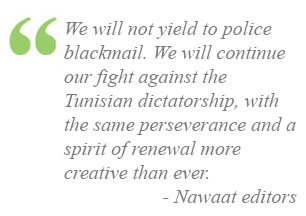 As the people’s uprising intensified, so too did the state’s attack on freedom of speech and the internet. The regime carried out intricate phishing attacks targeting activists’ email and social media accounts, in addition to stealing user passwords to infiltrate activist networks to conduct surveillance and erase criticism. However, the regime could not outsmart savvy digital activists. During a wave of arrests to suppress the uprising, Slim Amamou, one of Tunisia’s prominent bloggers, was arrested on January 6, 2011. He successfully used online networks Twitter and Foursquare to alert Nawaat bloggers about his arrest and whereabouts. [15]
As the people’s uprising intensified, so too did the state’s attack on freedom of speech and the internet. The regime carried out intricate phishing attacks targeting activists’ email and social media accounts, in addition to stealing user passwords to infiltrate activist networks to conduct surveillance and erase criticism. However, the regime could not outsmart savvy digital activists. During a wave of arrests to suppress the uprising, Slim Amamou, one of Tunisia’s prominent bloggers, was arrested on January 6, 2011. He successfully used online networks Twitter and Foursquare to alert Nawaat bloggers about his arrest and whereabouts. [15]
Tunisians felt newly emboldened to express their opposition to Ben Ali; as one woman declared, “We are too many now, we are too big, it is more difficult to silence us.” [16] Keeping up with the discontent boiling in the streets, Nawaat adapted its tactics and outreach to help propel the civic movement against Ben Ali. By posting pictures and videos of the protests and aggregating links to help international media networks to find accurate news sources, Nawaat connected Tunisians both to each other and to the international community. The site played a key role in amplifying Tunisians’ demands, as it posted numerous pictures, videos, and articles tagged with Sidi Bouzid, the birthplace of the revolution. As Tunisians posted content on Facebook, Nawaat sifted through it all, identifying the most important, determining where and when content was created, and translating it, thereby making the content useful to a broader audience. The site also created an alerts blog that spotlighted hundreds of the most relevant videos, including context and translation. [17] As such, Nawaat contributed to much of Al Jazeera and the international media’s coverage of the events, which then filtered back into Tunisia and informed Tunisians of the events taking place across the country. Nawaat allowed the message of the people’s uprising to ring loud and clear: injustice and repression could be no more. On January 14, 2011, Ben Ali fled to Saudi Arabia, and citizens throughout Tunisia and the region celebrated the first popular overthrow of an Arab dictator. As one Bahraini blogger cheered, “It actually happened in my lifetime! An Arab nation woke up and said ‘enough’.” [18]
Message and Audience
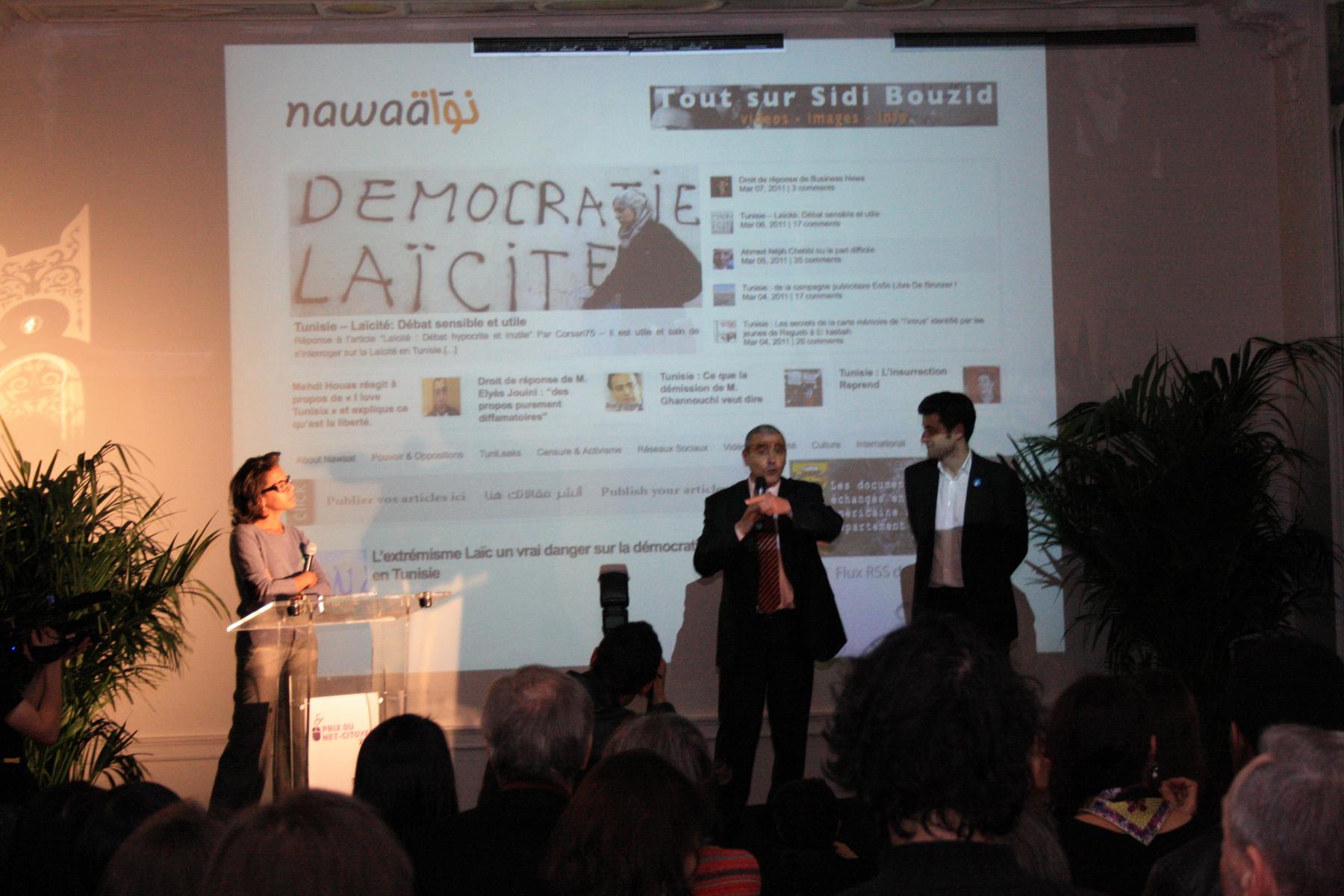 Ben Gharbia and Guerfali allow contributors to shape the dialogue on a gamut of issues relevant to Tunisian civil society. Posts are filed into categories such as politics, media, and society, and articles are readily accessible on a host of topics on marginalized topics, from cyberactivism to economic crises to political art to extramarital childbirth. Nawaat keeps Tunisians informed on these issues from an independent perspective, raising awareness of human rights and freedom of speech violations. At the same time, it publicizes events in Tunisia for a broader audience, encompassing the Arab and international communities, via posts in English and French. As such, catering to both the diverse linguistic character of Tunisia and a global audience, Nawaat is accessible in Arabic, French and English.
Ben Gharbia and Guerfali allow contributors to shape the dialogue on a gamut of issues relevant to Tunisian civil society. Posts are filed into categories such as politics, media, and society, and articles are readily accessible on a host of topics on marginalized topics, from cyberactivism to economic crises to political art to extramarital childbirth. Nawaat keeps Tunisians informed on these issues from an independent perspective, raising awareness of human rights and freedom of speech violations. At the same time, it publicizes events in Tunisia for a broader audience, encompassing the Arab and international communities, via posts in English and French. As such, catering to both the diverse linguistic character of Tunisia and a global audience, Nawaat is accessible in Arabic, French and English.
By linking Nawaat to Twitter, YouTube, Facebook and Posterous, Ben Gharbia and Guerfali have been able to circulate Nawaat’s material to a wide audience of over 62,000 fans on Facebook and 56,000 Twitter followers. This social media strategy has not only increased Nawaat’s potential audience but has also created a larger network of information sharing that was more difficult to target by regime censors.
Outreach Activities
Since Ben Ali’s flight from Tunisia, Nawaat has earned numerous awards and international recognition for its efforts. The blog was awarded the Index on Censorship’s New Media Award for its TuniLeaks initiative. For its crucial role in covering the social and political unrest in Tunisia that followed December 17, 2010, Nawaat was awarded the 2011 Netizen Prize from Reporters Without Borders and the 2011 Pioneer Award from Electronic Frontier Foundation.
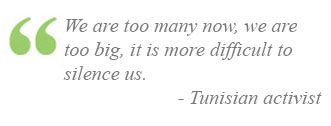 A few months after Ben Ali’s departure, one Tunisian praised the role of Nawaat and new media in the uprising: “An educated youth mastering perfectly the cyber-technology contributed to the downfall of the dictator.” He then asked, “Months after this feat … what becomes of Facebook? What becomes of this youth? What happens to our revolution?” [19]
A few months after Ben Ali’s departure, one Tunisian praised the role of Nawaat and new media in the uprising: “An educated youth mastering perfectly the cyber-technology contributed to the downfall of the dictator.” He then asked, “Months after this feat … what becomes of Facebook? What becomes of this youth? What happens to our revolution?” [19]
The answer is clear: Nawaat’s roles as a government watchdog and civic engagement arena have not ceased just because the people’s uprising succeeded in ousting Ben Ali. The ideals and demands that fueled the revolution are still at the forefront of Tunisian civil society and Nawaat’s content, which continues to be published on a daily basis. For instance, the blog features a nine-part series on unemployment in post-revolution Tunisia. [20] In October 2011, the blog covered the country’s first democratic elections, during which 54 percent of the Tunisian population cast their votes for parliament. [21]
Citing free and fair elections and improvements in political and civil liberties, Freedom House elevated Tunisia from ‘not free’ to ‘partly free’ in its Freedom in the World 2012 report. However, violations of freedom of expression and the press continue to occur. [22] During this transition, Nawaat continues to keep a watchful eye on the respect of free expression, cybersecurity, human rights and governmental accountability. There is a special tag on Nawaat for ‘democracy transition’ with articles deliberating on the process. In April 2012, a post appeared on the blog criticizing the illusion of liberty and lack of free expression after two men were sentenced to seven years in jail for criticizing Islam. [23] In May 2012, for instance, authorities confiscated two cameras belonging to Nawaat journalist Ramzi Bettaieb as he tried to cover military trials of Ben Ali and 22 others accused of the murder of protestors during the revolution. [24] In protest of limitations on journalistic coverage of court hearings and the military’s lack of transparency, Bettaieb launched a two-week hunger strike. [25]
Meanwhile, Nawaat has partnered with the Tunisian Ministry of Youth and Sports and Canal France Internationale to create 15 citizen journalism clubs in youth centers across the country. [26] As described by Nawaat, the project “embodies the heart of grassroots journalism…by helping local citizen journalists create their own regional content through a network covering issues directly relating to local residents.” [27] It will culminate in Nawaat’s creation of a national platform aggregating these local blogs.
As Guerfali says, prior to Ben Ali’s overthrow, “It was very clear who the bad guys were… now it’s a bit harder because we have to do our best to make sure the democratic process is on track. Whatever happens, democracy is coming. We will not fall into the trap set by anyone who does not want democracy.” [28]
Learn More
News & Analysis
“2010 Freedom in the World Report: Tunisia.” Freedom House. 2010.
“About” Global Voices. Last modified 11 September 2011.
Arab Fund for Arts and Culture. “Tunisia’s Cultural Sector After the Revolution.” 2011.
Mackey, Robert. “Tunisians Document Protests Online.” The Lede Blog. 12 January 2011.
Rosenberg, Simon and Ross, Alce. “A Laptop in Every Backpack.” NDN. 1 May 2007.
Ryan, Yasmine. “Tunisia’s Dissident Blog Stays True to Form.” Al Jazeera. 13 May 2011.
“Tag: ‘Sidi Bouzid’.” Nawaat. Last modified 6 April 2012.
TuniLeaks. Last modified 9 July 2011.
“Tunisia: Combatting Impunity, Restoring Security.” International Crisis Group. 9 May 2012.
“Tunisia: Seven Years for Mocking Islam.” Human Rights Watch 6 April 2012.
Books
Joyce, Mary. Digital Activism Decoded: The New Mechanics of Change. New York and Amsterdam: International Debate Education Association, 2010.
Murphy, Emma. Economic and Political Change in Tunisia: From Bourguiba to Ben Ali. Hampshire: Palgrave MacMillan, 1999.
The New Arab Revolt: What Happened, What it Means, and What Comes Next. The Council on Foreign Relations/Foreign Affairs. New York, 2011.
Multimedia
“Sami Ben Gharbia from Global Voices on Internet Repression.” YouTube. 25 June 2007.
“Sami Ben Gharbia: Do Censorship and Repression Kill Content on the Web?” YouTube. 23 April 2010.
[2] “Digital Activism: Arabs Can Do It Themselves. Interview with Sami Ben Gharbia.” Perspectives: Political Analysis and Commentary from the Middle East. Heinrich Böll Stiftung 2011.
[3] The Editors, “Nawaat.org Suspendu. Nawaat.org Survivra!” Nawaat, 29 November 2004.
[4] Astrubal. “Qui utilise l’avion de la présidence de la République Tunisienne” Nawaat. 28 August 2007.
[5] Ben Gharbia, Sami and Guerfali, Riadh. “A First Glimpse at the Internet Filtering in Tunisia.” Translated by Jillian C. York. Nawaat. 18 August 2010.
[6] Ben Mhenni, Lina “Tunisia: Censorship Continues as Wikileaks Cables Make the Rounds” Global Voices, 7 December 2010.
[7] “Digital Activism: Arabs Can Do It Themselves”.
[8] Puel, Helene. “Astrubal: La Revolution en Tunisie Aurait eu Lieu sans Internet.” 01 Net. 11 March 2011.
[9] Puel, Helene. “Astrubal”.
[10] Ben Gharbia, Sami. “The Internet Freedom Fallacy and Arab Digital Activism.” Nawaat. 17 September 2010.
[11] “Nawaat declines the Arab eContent Award 2011” Nawaat. 2 May 2011.
[12] “2010 Freedom in the World Report: Tunisia.” Freedom House. 2010.
[13] “Sami Ben Gharbia: Do Censorship and Repression Kill Content on the Web?” YouTube. 23 April 2010.
[14] Kirkpatrick, David D. “Tunisia Leader Flees and Prime Minister Claims Power.” New York Times. 14 January 2011.
[15] “Tunisia : Blogger Slim Amamou arrested today.” Nawaat 6 January 2011.
[16] Kirkpatrick, David D. “Tunisia Leader Flees and Prime Minister Claims Power.”
[17] “Digital Activism: Arabs Can Do It Themselves. ”
[18] Shadid, Anthony. “Joy as Tunisian President Flees Offers Lesson to Arab Leaders.” New York Times. 14 Jan. 2011.
[19] Ben Amor, Zied. “Tunisie: Les Actes d’une révolution balbutiante” Nawaat. 1 June 2011.
[20] Mejri, Karim. “Dossier Spécial: Le chômage dans la Tunisie post 14 Janvier [Part1]: Qu’est-ce qu’un chômeur ?” Nawaat. 16 April 2012.
[21] “Final Tunisian election results announced.” Al Jazeera English. 14 Nov. 2011.
[22] “Conviction of Tunisian TV Station Owner is Affront to Freedom of Expression.” Freedom House. 3 May 2012.
[23] Hendoud, Henda. “Tunisia: ‘The Illusion of Islam’ unveils the illusion of liberty.” Translated by Edith Mulhern. Nawaat. 19 April 2012.
[24] “Tunisian blogger on hunger strike to ‘defend press freedom.’” Al Arabiya English. 5 June 2012.
[25] Abrougui, Afef. “Tunisian journalist ends the hunger strike.” Uncut blog, Index on Censorship. 13 June 2012.
[26] “Tunisia: A National Network of Alternative and Citizen Media.” Global Voices. 31 March 2012.
[27] Ben Hassine, Wafa. “Local journalism collectives reclaim media space.” Nawaat. 26 March 2012.
[28] Ryan, Yasmine. “Tunisia’s Dissident Blog Stays True to Form.” Al Jazeera. 13 May 2011.

